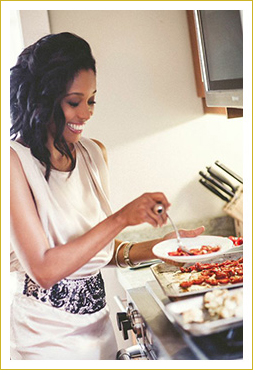MY BACKSTORY AND THE ESSENTIAL INGREDIENTS OF
WHAT I KNOW
At 31, I had two major roles. On-screen, I worked as a TV actor and, off-screen, I was wife to a brilliant, Sicilian-born chef, my husband Saro. It was an ideal life for the girl who had always dreamed of a life in the arts and who begged the last bite at the end of a delicious meal.In the restaurant business, a chef’s wife is known as a “kitchen widow” because their partners are lost to the demands of the restaurant business.
When Saro wasn’t engaged in high-volume, time sensitive cooking, we filled our Los Angeles home with the flavors and aromas of his native Sicily. An impromptu dinner party often followed. We had carved out a life suited to feed both our creative souls.
Yet the paths life puts before us are often marked with unexpected turns. Without any warning, Saro was diagnosed with a rare, life threatening bone cancer, leiomyosarcoma. The floor fell out from underneath us and a new life rose up to meet us. His career as a professional chef was over in a flash. For me, the bright lights of Hollywood went momentarily into soft focus. What became immediately clear was the realization that I was about to help the human being I loved most in the world fight the battle of his life. In the course of a single afternoon, I took on a role familiar to millions of Americans, I became a primary caregiver.
We did what many people do when cancer hits, we put our noses down and prepared to fight the good fight. Initially, I thought we could merely will ourselves back into our old life with diet, meditation, love, and laughter. If we did all the “right” things, we’d find our way into a lifetime of tomorrows. Cancer would be a part of our narrative, but it wouldn’t define it.
I was partially right. Love and laughter are essential ingredients to a life under assault. Eating strategically makes significant differences. With grace, luck, dedicated doctors, brilliant nurses and practitioners, numerous clinical trials, personal and emotional tenacity, my husband defied the odds.
In the end, our “lifetime” lasted ten miraculous years. Looking back, we had that time to learn about deep, soulful living in times of crisis.
“It takes a village” never has more resonance than when illness strikes. People often ask me how I did it. They are curious about the perspective of the person closest to the patient – the wife and caregiver. How exactly did I manage being sole income earner, mother, patient advocate, sometimes nurse, and household manager. How did I spend nights at a hospital bedside and days on-set? I have many answers to those questions. However, the ONE answer I always give is that the journey was made bearable by the love and support of those who rallied around us. A village of people appeared along the path with a helping hand – family, friends, and even strangers. They understood that supporting the caregiver is sometimes the best way you can support the patient.
Long-term caregiving means to witness, assist and love someone through a difficult journey. To do that I had to learn how to build a network of friends and family who could go the distance. I had to learn how to ask those people for help. I had to learn to be honest about my own fears, vulnerability, my burnout and even resentment. (Yes, caregivers have all that.)
Often long-term caregiving ends in loss. Grief doesn’t move in a straight line. Each person’s grief journey will be unique to their life experience, personality and relationship to the person who has passed away. Saro passed away before I learned how to make a perfect risotto, before we could celebrate our twentieth wedding anniversary, before our daughter could make him tiramisu. But not before we got a chance to say what we wanted to say to each other. Not before he made me promise to continue to live fully and openly, when I felt ready.
Today, I am a widow (I always stumble when I say that) and a mother (that always makes me smile). The chef’s daughter is a gregarious, wise, funny, soulful human being with tremendous compassion. The chef’s widow is moving forward in the role of kitchen widow with a mission to give back, one flavor at a time.



